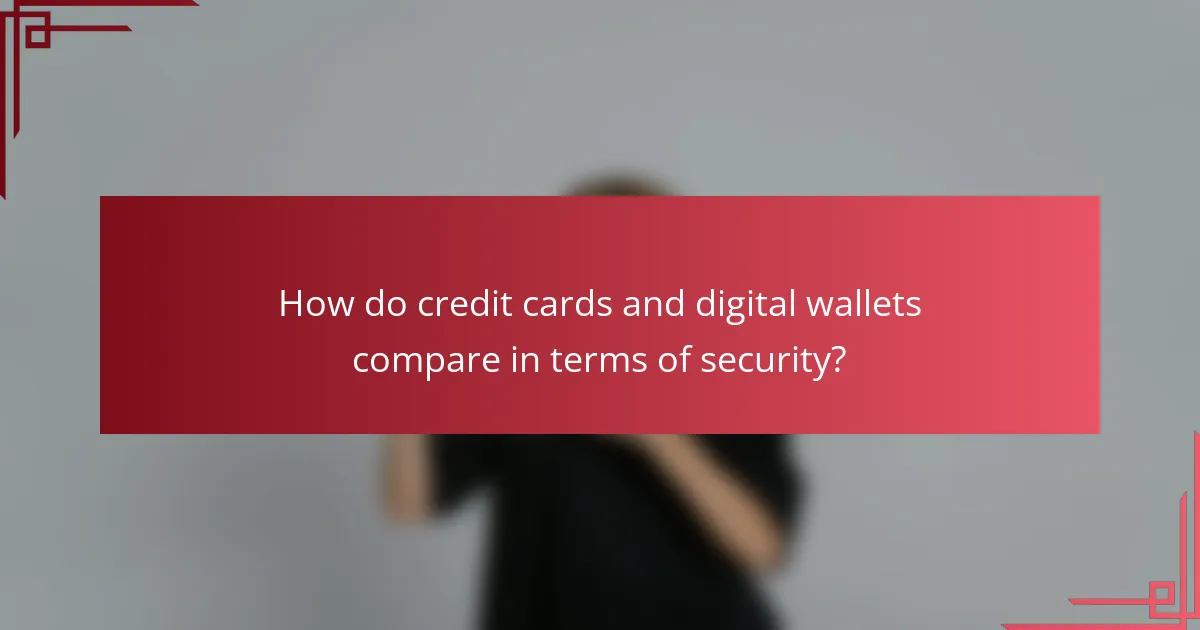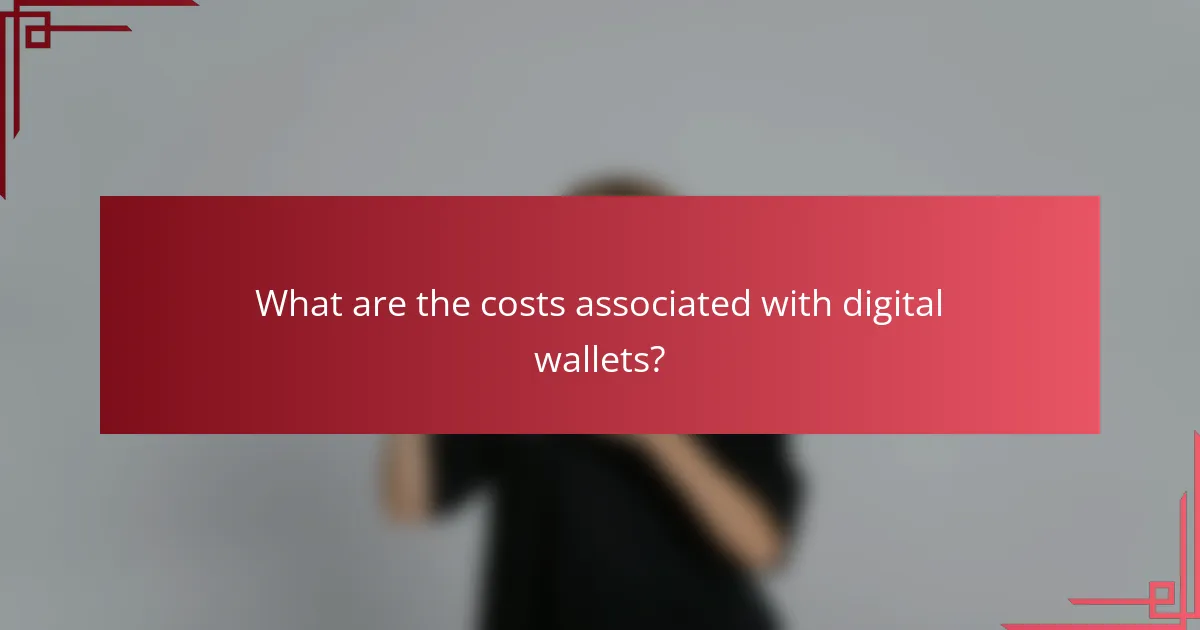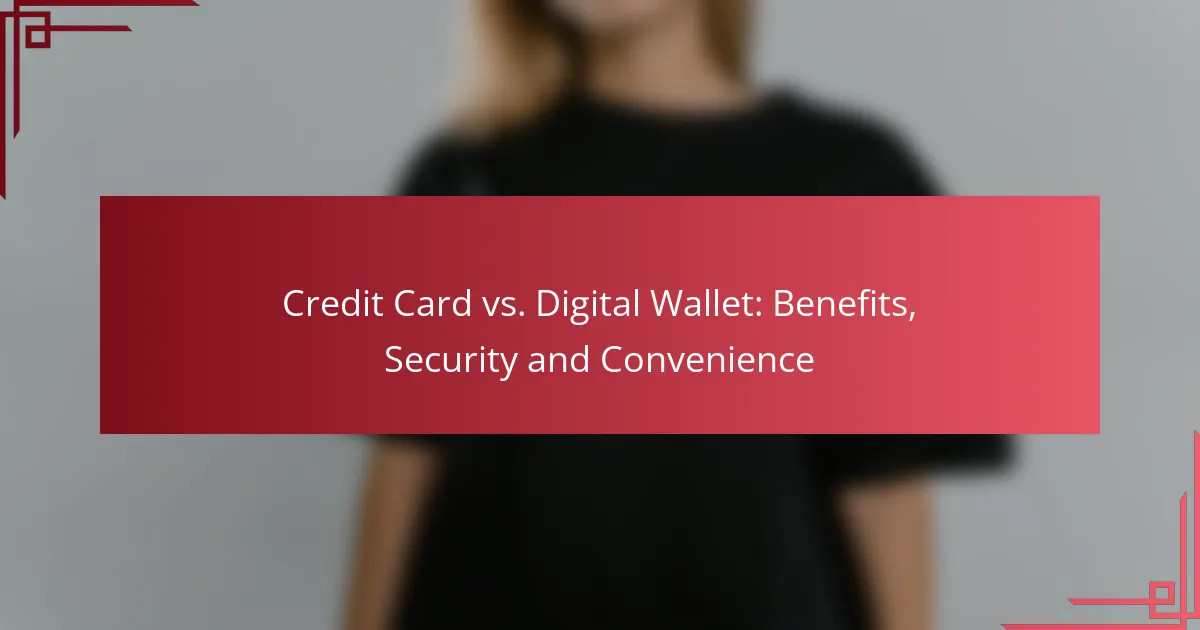In today’s fast-paced world, choosing between credit cards and digital wallets involves weighing their unique benefits, security features, and convenience. Credit cards provide rewards and purchase protection, while digital wallets enhance transaction speed and security through advanced technology. Understanding these differences can help consumers make informed financial decisions that suit their lifestyles.

What are the benefits of credit cards?
Credit cards offer several advantages, including rewards, purchase protection, and the ability to build credit. These benefits can enhance your financial flexibility and provide added security during transactions.
Rewards programs
Many credit cards come with rewards programs that allow you to earn points, cash back, or travel miles for every dollar spent. Depending on the card, you might earn anywhere from 1% to 5% back on purchases, which can accumulate quickly over time.
When choosing a rewards card, consider your spending habits. For instance, if you frequently travel, a card that offers travel rewards may be more beneficial than one focused on cash back. Always check for any annual fees that might offset the rewards you earn.
Purchase protection
Credit cards often provide purchase protection, which can cover damaged or stolen items purchased with the card. This protection can last from a few months to a year, depending on the issuer’s policies.
Additionally, many credit cards offer extended warranties on eligible purchases, which can be a valuable feature for expensive items. Always read the terms and conditions to understand the extent of the coverage and any exclusions that may apply.
Credit building
Using a credit card responsibly can help you build a positive credit history, which is crucial for obtaining loans or mortgages in the future. Timely payments and low credit utilization can significantly boost your credit score over time.
To maximize credit-building potential, aim to pay off your balance in full each month and keep your utilization below 30% of your credit limit. Avoid opening too many new accounts at once, as this can negatively impact your score.

What are the benefits of digital wallets?
Digital wallets offer several advantages over traditional credit cards, including convenience, enhanced security, and effective budget tracking. They allow users to store multiple payment methods securely on their devices, making transactions faster and easier.
Convenience and speed
Digital wallets streamline the payment process, allowing users to complete transactions in seconds. With just a tap or a scan, payments can be made without the need to carry physical cards or cash.
Many digital wallets also support online shopping, enabling users to check out quickly without entering card details repeatedly. This can significantly reduce the time spent on purchases, especially for frequent online shoppers.
Enhanced security features
Digital wallets often incorporate advanced security measures such as encryption, tokenization, and biometric authentication. These features help protect sensitive information from unauthorized access, making transactions safer than traditional credit card payments.
Additionally, many digital wallets provide real-time transaction alerts, allowing users to monitor their accounts for any suspicious activity immediately. This proactive approach enhances overall security and peace of mind.
Budget tracking
Digital wallets can help users manage their finances by providing tools for budget tracking and spending analysis. Many wallets categorize expenses automatically, giving users insights into their spending habits.
Some digital wallets even allow users to set spending limits or alerts, helping them stay within their budget. This feature can be particularly useful for individuals looking to control their finances more effectively.

How do credit cards and digital wallets compare in terms of security?
Credit cards and digital wallets both offer security features, but they differ in their approaches. Digital wallets often provide enhanced security through advanced technology, while credit cards rely on traditional fraud protection measures.
Fraud protection measures
Credit cards typically offer robust fraud protection, allowing users to dispute unauthorized charges easily. Many issuers follow the Fair Credit Billing Act, which limits liability for fraudulent transactions to a small amount, often just $50.
Digital wallets, on the other hand, utilize tokenization, which replaces sensitive card information with a unique identifier. This means that even if a transaction is intercepted, the actual card details remain secure.
Data encryption
Both credit cards and digital wallets use encryption to protect data during transactions. Credit card companies often employ SSL (Secure Socket Layer) technology to encrypt data sent over the internet.
Digital wallets may use more advanced encryption methods, such as end-to-end encryption, ensuring that data is encrypted from the moment it leaves the user’s device until it reaches the merchant. This reduces the risk of interception significantly.
Two-factor authentication
Two-factor authentication (2FA) adds an extra layer of security for both credit cards and digital wallets. Many credit card issuers now offer 2FA through SMS or authentication apps, requiring users to verify their identity before completing a transaction.
Digital wallets often incorporate 2FA as a standard feature, using biometric data like fingerprints or facial recognition, making unauthorized access much more difficult. This added security measure is particularly beneficial for users who frequently make online purchases.

Which option is more convenient for everyday transactions?
Digital wallets generally offer greater convenience for everyday transactions compared to traditional credit cards. They allow for quick payments through smartphones or smartwatches, reducing the need to carry physical cards and speeding up the checkout process.
Mobile payment capabilities
Digital wallets enable mobile payments through Near Field Communication (NFC) technology, allowing users to tap their devices at payment terminals. This method is often faster than swiping a credit card and can be more secure due to tokenization, which protects card information.
Many digital wallets support various payment methods, including credit cards, bank accounts, and even cryptocurrencies. This flexibility allows users to choose their preferred payment option easily.
Acceptance at retailers
While digital wallets are increasingly accepted at many retailers, credit cards still have broader acceptance, especially in less urban areas or smaller businesses. Major chains and online platforms typically support digital wallets, but it’s wise to check if a specific store accepts them before relying solely on this payment method.
In regions like Europe, digital wallet acceptance is growing rapidly, with many shops and restaurants now equipped for contactless payments. However, in some areas, traditional credit cards may still be the more reliable option.
Integration with loyalty programs
Many digital wallets integrate seamlessly with loyalty programs, allowing users to earn points or rewards automatically when making purchases. This integration can enhance the shopping experience by simplifying the process of collecting and redeeming rewards.
Credit cards often come with their own loyalty programs, which can offer significant benefits like cash back or travel rewards. However, users should compare the rewards from both options to determine which aligns better with their spending habits.

What are the costs associated with credit cards?
Credit cards come with various costs that can impact your overall financial health. Understanding these costs is essential for making informed decisions about using credit cards effectively.
Annual fees
Many credit cards charge an annual fee, which can range from zero to several hundred dollars. Premium cards often offer more rewards or benefits, justifying higher fees, while basic cards may have no annual cost at all. Consider whether the rewards and features you receive outweigh the fee.
Interest rates
Interest rates on credit cards can vary significantly, typically ranging from low single digits to over twenty percent. If you carry a balance, these rates can lead to substantial interest charges. It’s advisable to pay off your balance in full each month to avoid these costs.
Foreign transaction fees
When using a credit card abroad, many issuers charge foreign transaction fees, usually around 1-3% of each purchase. Some cards, particularly travel-focused ones, waive these fees, making them better options for international travelers. Always check your card’s terms before using it overseas to avoid unexpected charges.

What are the costs associated with digital wallets?
Digital wallets can incur various costs, including transaction fees, service fees, and potential costs for premium features. Understanding these expenses is essential for users to manage their finances effectively.
Transaction Fees
Many digital wallets charge transaction fees for sending or receiving money, which can vary based on the payment method used. For instance, using a credit card may incur higher fees compared to linking a bank account. It’s important to review the fee structure of your chosen digital wallet to avoid unexpected charges.
Service Fees
Some digital wallets may have monthly or annual service fees, particularly for premium accounts that offer additional features. These fees can range from a few dollars to over a hundred dollars per year, depending on the service level. Users should weigh the benefits of premium features against these costs to determine if they are worth it.
Currency Conversion Fees
If you use a digital wallet for international transactions, currency conversion fees may apply. These fees can be a percentage of the transaction amount and vary by provider. Always check the conversion rates and fees before making international payments to ensure you are getting a fair deal.
Hidden Costs
Be aware of potential hidden costs, such as fees for withdrawing funds to your bank account or inactivity fees for accounts that are not used regularly. These can add up over time and impact your overall savings. Regularly reviewing your account statements can help identify any unexpected charges.
